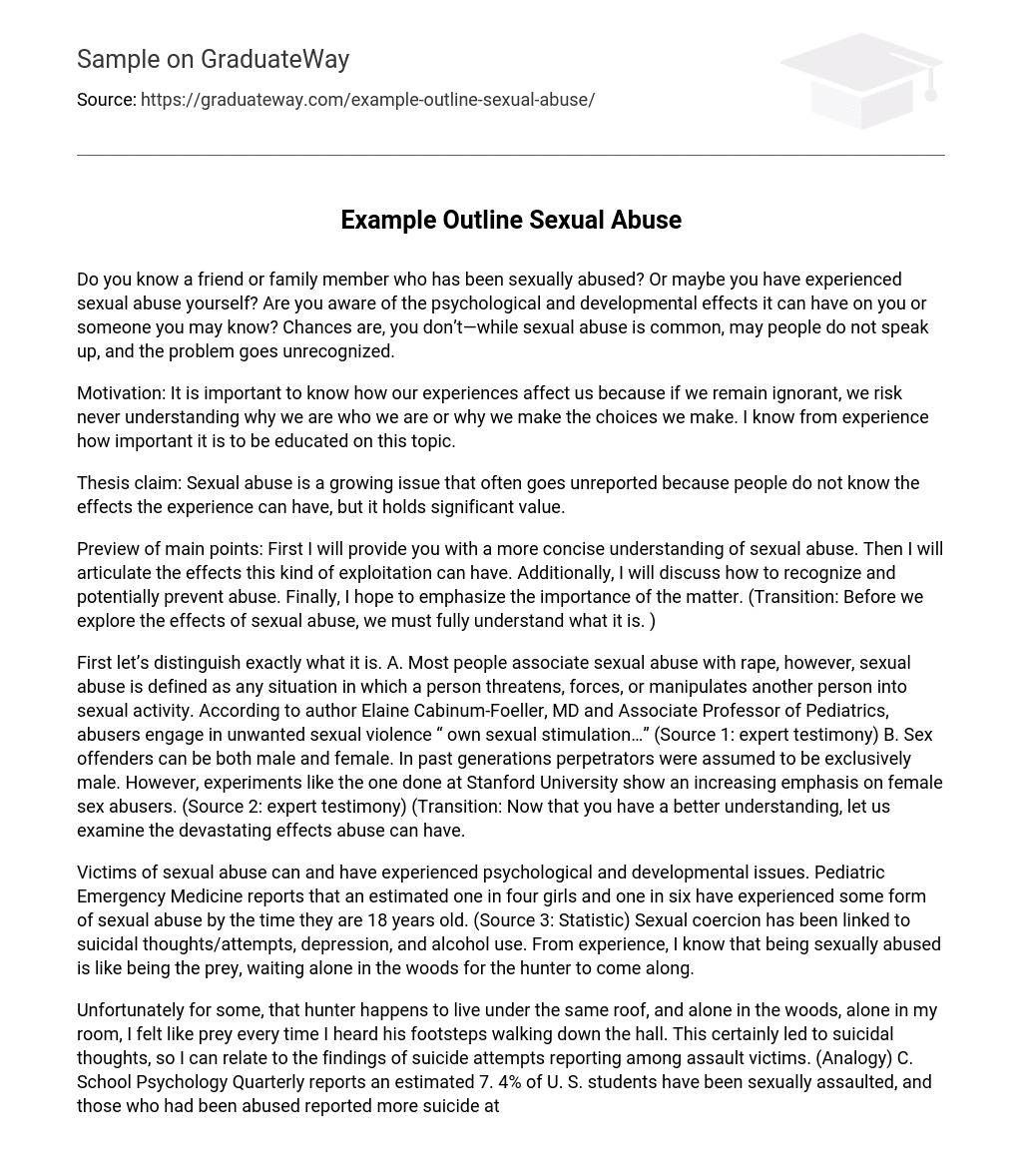Have you or someone you care about experienced sexual abuse? Are you familiar with the psychological and developmental consequences it can have on individuals, as well as their loved ones? It’s possible that you may not be aware because many people choose to keep silent about this matter, causing it to be disregarded.
Recognizing the significance of comprehending our identity and decision-making, I personally have come to understand the importance of understanding the impact of our experiences.
The thesis claim states that sexual abuse is a significant and escalating issue. However, it often goes unreported because people are not fully aware of the profound consequences it has.
Preview of main points: Firstly, a concise explanation of sexual abuse will be provided, followed by an examination of its impact. Furthermore, the identification and potential prevention of abuse will be discussed. Ultimately, my objective is to emphasize the importance of this issue. (Transition: Before delving into its effects, it is crucial to have a comprehensive understanding of the definition of sexual abuse.)
The scope of sexual abuse extends beyond rape and includes situations where one person coerces or manipulates another into engaging in sexual activity. According to Dr. Elaine Cabinum-Foeller, an Associate Professor of Pediatrics, perpetrators commit acts of unwanted sexual violence for their own satisfaction (Source 1: expert testimony). It is important to note that both males and females can commit sexual offenses, contrary to previous assumptions that only males were capable of such actions. Stanford University conducted a study revealing a rise in the occurrence of female sex offenders (Source 2: expert testimony). Now that we have a better understanding of the nature of sexual abuse, let’s explore its devastating consequences.
Statistic (Source 3) reveals that about 25% of girls and 16% of boys encounter sexual abuse prior to turning 18, as stated by Pediatric Emergency Medicine. Such abuse can result in diverse psychological and developmental problems like suicidal thoughts/attempts, depression, and alcohol consumption. Drawing from my own personal experience, I can liken being sexually abused to the sensation of being a vulnerable prey in the wilderness, anxiously anticipating the predator’s arrival.
Living with a person who hunts them is unfortunately the situation some individuals find themselves in. I personally experienced this while residing alone in a wooded area, specifically within my own room. The sound of his footsteps echoing through the corridor made me feel pursued and vulnerable, leading to thoughts of ending my own life. This aligns with research studies that establish a link between assault victims and suicide attempts. An article published in C. School Psychology Quarterly reveals that approximately 7.4% of students in the United States have encountered sexual assault. Of those who have been abused, there is a higher incidence rate of attempted suicide compared to non-victims (Source 4: Statistic).
Psychologist Jessica Thurchik from Stanford University states that individuals who have been sexually victimized are more likely to develop problems like post-traumatic stress disorder, aggression, and lower academic achievement. Thurchik cites a study showing that college men who have experienced sexual victimization tend to drink more alcohol than those who haven’t (Source 5: Expert Testimony). This highlights the need to acknowledge signs of abuse and take preventative action.
Now let’s discover the evident indicators and potential actions to take. Occasionally, the display of sexual abuse is unclear and there are seldom any physical observations. Pediatric Emergency Medicine states that those who have experienced sexual abuse start exhibiting behavioral changes such as increased aggression, detachment, or depression (Source 3: Expert Testimony). An example that further illustrates this is when my close friend was sexually abused; she experienced a significant detachment from others and fell into a deep state of depression (Example: Personal).
Research mentioned in School Psychology Quarterly shows that there is uncertainty regarding the connection between alcohol consumption and future sexual assault. Nevertheless, it is widely believed that consuming alcohol does heighten the risk of abuse. To safeguard against harm, it is recommended to restrict alcohol intake. This knowledge holds significance as it sheds light on the impact of sexual abuse and offers preventive strategies.
In conclusion, our identities and actions are shaped by our experiences. I have always been perplexed by my emotions. It is worth noting that being a survivor of sexual abuse does not dictate one’s future decisions, such as struggling with alcoholism, abandoning education, or battling depression. Nevertheless, it is imperative for us to not dismiss or diminish our encounters, regardless of how trivial they may seem. (Transition: I implore everyone to heed my message and recognize the gravity of sexual abuse as a real problem.)
In summary, sexual abuse refers to a variety of unwanted activities that can be carried out through force, threats, or manipulation. The consequences of such abuse are serious and can result in mental health issues like depression, thoughts of suicide, and alcoholism. While not always apparent, sexual coercion is prevalent in society. Therefore, it is essential to remain aware of our surroundings and the behavior of others. Avoiding substance abuse is also crucial. We must recognize and validate the experiences that shape our identities because they inevitably influence us. If you have personally experienced sexual abuse or know someone who has, it is likely affecting you in some way.
It is important to acknowledge the immorality and increasing issue of sexual abuse, whether it happens because of excessive alcohol consumption at a party or as an abrupt act of cruelty in any environment.





